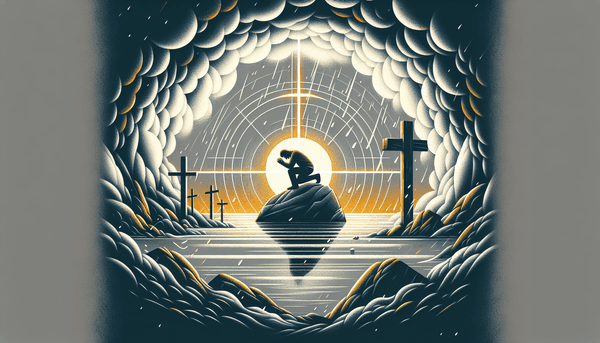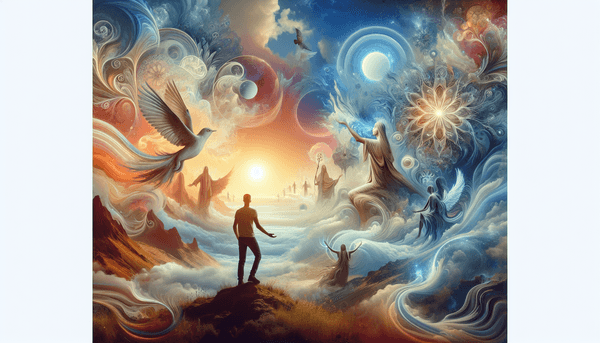The Uniqueness of Spiritual Journeys
Each person's spiritual journey is as individual as their fingerprint, and the Bible reminds us that 'the peace of God, which transcends all understanding, will guard your hearts and your minds in Christ Jesus' (Philippians 4:7). This peace and joy we seek are fruits of the Spirit (Galatians 5:22-23), not always visible to the eye, but deeply felt in the heart. It's a common misconception that outward manifestations of spirituality, such as a serene demeanor or an aura of happiness, are definitive signs of divine favor. In truth, these qualities vary among individuals and do not necessarily reflect one's standing with God. The state of the heart and the ongoing relationship with God are what matter most. Spiritual growth involves engaging in practices that foster this connection, such as prayer, meditation, and studying scripture, as well as seeking fellowship with a supportive community. For those seeking guidance, 'You will seek me and find me when you seek me with all your heart' (Jeremiah 29:13), and a trusted spiritual mentor can be a valuable source of wisdom and encouragement. 'Be still, and know that I am God' (Psalm 46:10), teaches us to be patient with ourselves as we grow, understanding that 'There are different kinds of gifts, but the same Spirit distributes them' (1 Corinthians 12:4-6). Each journey is unique, and each heart finds its peace in its own time.
The Role of Animals in Creation
The tapestry of Creation includes not just humanity but all living creatures, each playing a vital role in the balance of life. God's command to 'be fruitful and increase in number; fill the earth and subdue it' (Genesis 1:28) was a charge to all of Creation, and the diversity of animals reflects the majesty of God's work. The book of Genesis tells us that God created a multitude of living creatures, blessing them with fertility and the ability to multiply. This intricate balance of life is a testament to the Creator's design, where every animal and bird has its place, and 'every animal of the forest is mine, and the cattle on a thousand hills. I know every bird in the mountains, and the insects in the fields are mine' (Psalm 50:10-11). Humans are given a unique responsibility to care for and have dominion over animals, a task that requires stewardship and respect for all forms of life. This spiritual duty to care for God's creatures is underscored in Proverbs: 'The righteous care for the needs of their animals, but the kindest acts of the wicked are cruel' (Proverbs 12:10). As stewards of Creation, we are called to reflect on the interconnectedness of life, recognizing the bond between humans and animals as part of a greater divine plan.
Conclusion
The journey toward spiritual fulfillment, marked by the pursuit of peace and joy, is a path that intertwines with the Biblical narrative of Creation. It unveils the profound nature of our individual walks with God and the collective responsibility we share towards the world we inhabit. Grounded in the teachings of scripture, we are encouraged to explore our unique spiritual landscapes with patience and intention, drawing wisdom from the divine Creator who orchestrates all life. As we seek to deepen our understanding and connection to the divine, may we remember that our spiritual growth is a reflection of the living God, who invites us to find solace and strength in His presence. In this exploration of spirituality, rooted in the Creation story, serves as a reminder that we are all works in progress, ever-evolving in the image of the One who made us.
FAQ
Q: What does the Bible say about the uniqueness of our spiritual journeys?
A: The Bible teaches that each person's spiritual journey is unique, and the expression of qualities like peace and joy can vary from one individual to another. It emphasizes the state of the heart and the ongoing relationship with God over outward manifestations (Philippians 4:7, Galatians 5:22-23).
Q: How can I cultivate a deeper sense of peace and joy in my life?
A: Cultivating a deeper sense of peace and joy can involve engaging in spiritual practices such as prayer, meditation, studying scripture, and seeking fellowship with a supportive community. Patience and self-compassion are also important, as spiritual growth is a process (Jeremiah 29:13, Psalm 46:10).
Q: What is the significance of the seven days of Creation in the Bible?
A: The seven days of Creation represent the time period in which God brought the universe and all living things into existence, highlighting God's power and intentionality. It serves as a foundational story that underscores God as the ultimate Creator and sustainer of all things (Genesis 1:1-2:3, Exodus 20:11).
Q: How are humans and animals portrayed in the Creation narrative?
A: Humans are created in the image of God and given responsibility over the earth and its creatures. Animals are also a significant part of Creation, each with a purpose and place within God's plan. Humans are called to be stewards of all living creatures, reflecting God's care and creativity (Genesis 1:26-28, Genesis 2:19-20, Proverbs 12:10).






